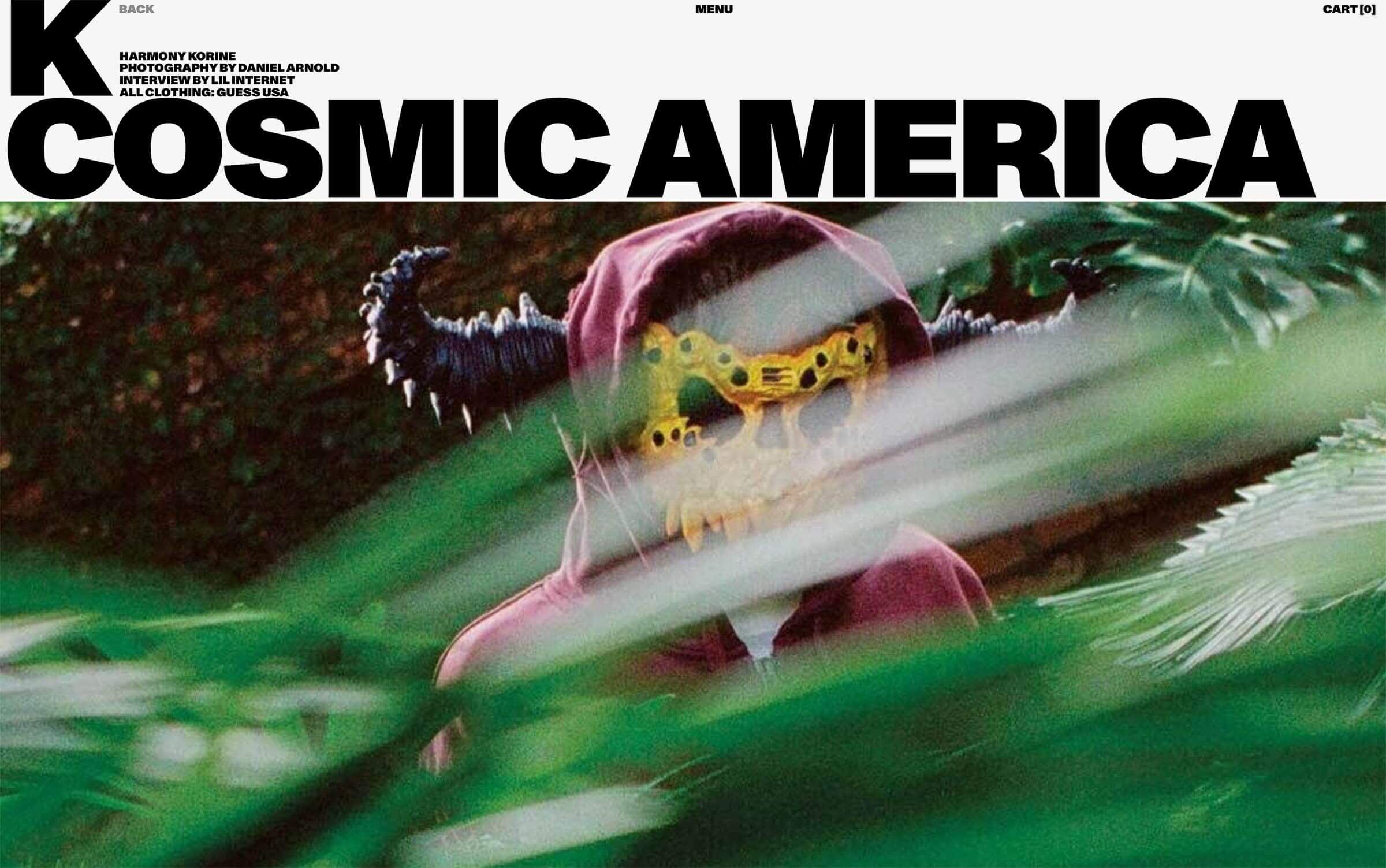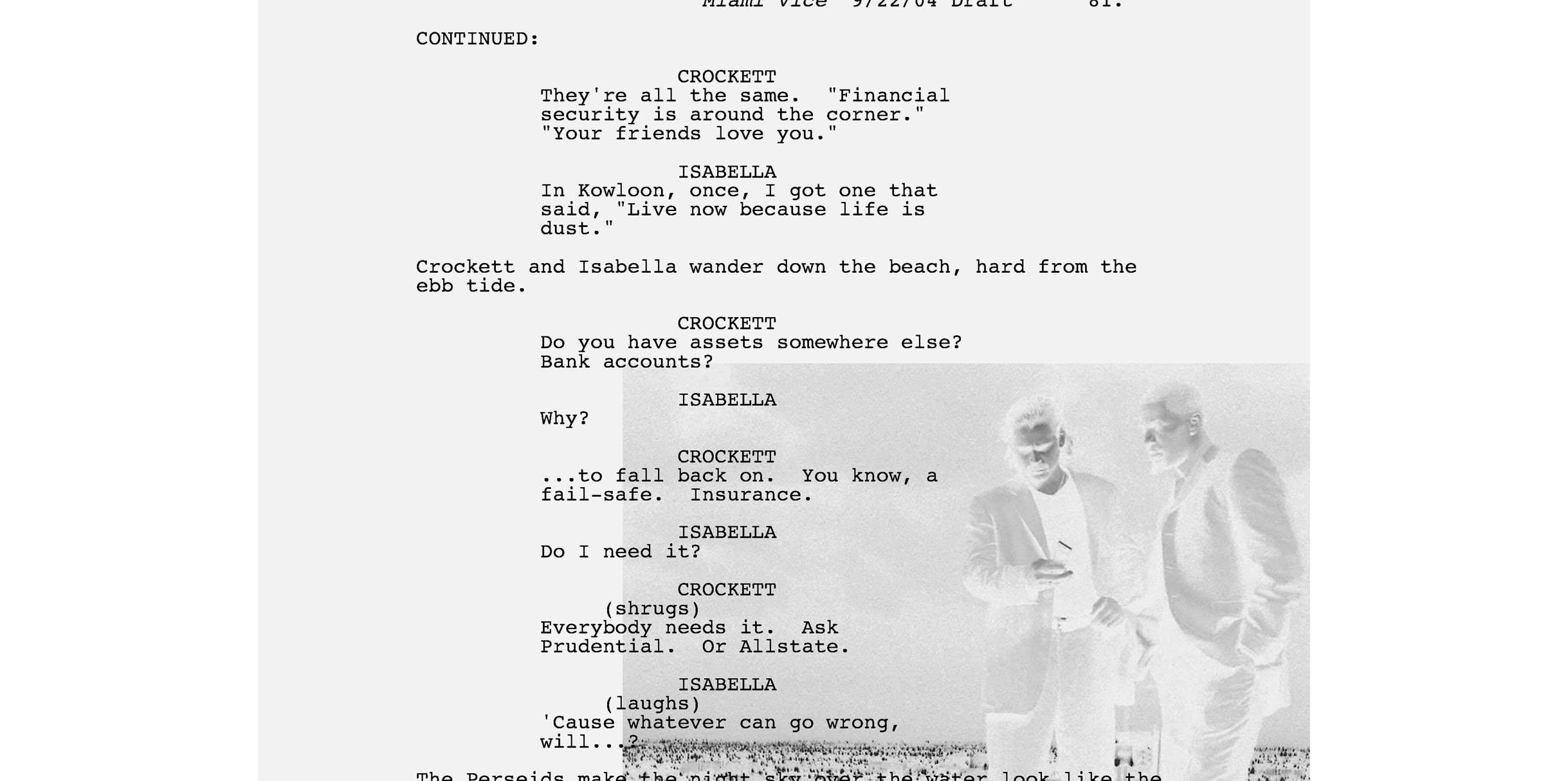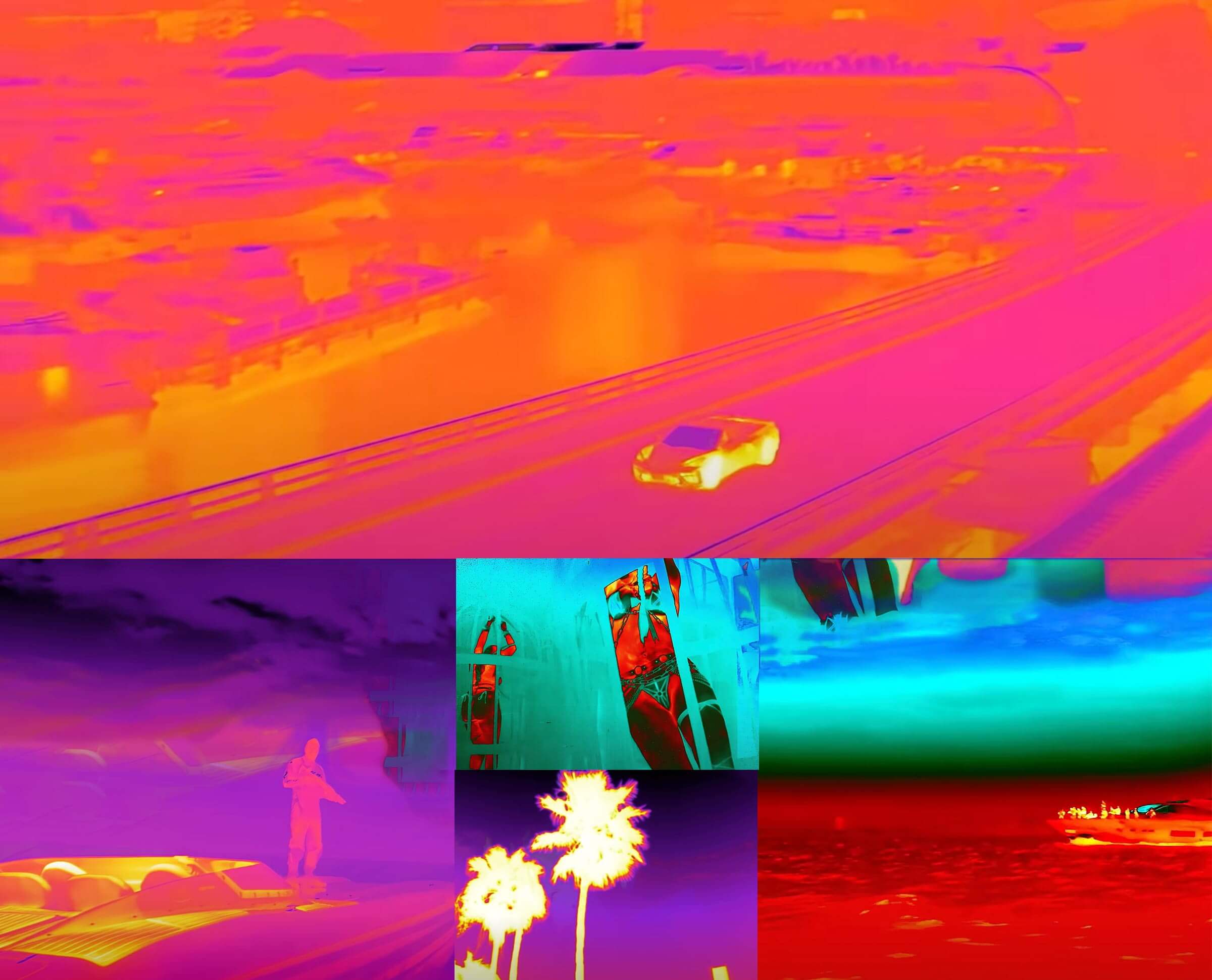If we think it is a game, then it becomes a game
So I haven’t written anything on here for a year and a half. It turns out the old saying is true; freelancing on interesting projects while raising a small human and navigating the US visa system doesn’t leave much time for writing blog posts. But don’t worry. We’ve been having fun, surfing the doom loop, learning to love the smell of napalm in the morning, and so on.
Last week Ella and I were hanging out in MagCulture and I picked up the latest copy of Kaleidoscope, mainly because of the interview with Harmony Korine. (Also a little because anything designed by Kasper-Florio makes me happy. But mostly for the interviews.)
Korine has a large body of great work, but is relevant for here because he wrote and directed Spring Breakers, one of the few good movies to be made about our post-internet reality.

Obviously, and as you all know, the great post-internet era movie all others are compared to is Michael Mann’s Miami Vice (2006). As Jean-Baptiste Thoret has explored at length, reality in Miami Vice doesn’t exist within the protagonists viewpoint. Instead, it exists as a constant bombardment of data and communication from all over the world, at all times. All the protagonists can do is attempt to make the best sense of things, based on the information they have available at the time, acting on it with the knowledge that reality is constantly changing around them.
The post-urban (and post-human) world of Miami Vice is a confused, fragmented and controlled world that holds together only by the financial flux that crosses it and the electronic images (surveillance cameras, radars, computer screens, etc.) recreating the simulacrum. There is no other logic than that of offer and demand, of movement in all directions imposed by economic private interests. Little matter, then, whether the goods are legal or not, little matter, too, the nature of the market, since the film treats capitalism like a war (Jesus Montoya, the drug godfather, hooked on Bloomberg TV), with his exploitation of resources of the Third World (here, the Dominican Republic, Paraguay and Uruguay), the merciless elimination of rivals and its calculated violence. Impressive is the way in which Mann views the cartography of this world in flux, where one goes in the space of an edit from Brazil to Paraguay, from Miami to Geneva, but also from the Law to its underside, according to a logic of intensive and breathtaking permutation. The contemporary world such as the film describes is expressed in the sentiment of a generalized feeling, of an integral proximity of spaces and individuals, permitted by an ultra-sophisticated technological environment. It is a misleading proximity, since the solitude of beings (total in Miami Vice) gets worse as the virtual exchanges develop.
Jean-Baptiste Thoret, Gravity of the Flux: Michael Mann’s Miami Vice
The Flux as a concept for describing our post-internet world is super helpful for thinking about all sorts of things. The Internet Encyclopaedia of Philosophy has a neat little summary of Heraclitus ideas of Flux: “1, everything is constantly changing and 2, opposite things are identical, so that 3, everything is and is not at the same time.”
Or, internet connectivity has created a reality that is constantly changing. And because we’re bound by reality, this means we are constantly changing too. As a result, it’s easy to feel that our identities and relationships within the flux are constantly being stretched and tested.

Where Miami Vice follows a couple of introvert boomer cops attempting to navigate the flux (and Michael Mann’s other post-internet movie Black Hat less successfully follows an activist hacker unsuccessfully trying to influence the flux), Harmony Korine’s Spring Breakers follows a group of teenage girls who are totally and unquestioningly immersed in it, and the consequences of that immersion on those around them.

Lil Internet: I think about this scene at the beginning of Spring Breakers depicting a lecture hall full of teen millennials, where the professor is talking about young people coming back from war totally changed. And all the students are just staring at their glowing laptop screens, which all change color at the same time.
Cosmic America, Harmony Korine and Lil Internet in conversation
I think that portrayal of immersion makes Korine potentially a more interesting person to listen to about internet culture than Mann, who I imagine would just make well-observed complaints.
And so in the Kaleidoscope interview Lil Internet mentions Korine’s Mistakist Declaration, which he’s been using as a manifesto or set of creative principles since 2002. It’s totally new to me, a very good (although admittedly in 2024 we’d want to reword “Killing yourself is a show of strength” into something a more sensitive/less triggering).
I have never been one to gravitate toward the labelling of things. But i feel forced to declare my adherance to a mode of creation known as "mistakism".
I am a "mistakist" and all the work I produce adheres to the tenants attached to the label/movement.
(factors involved include)
All modes of work exist to produce a single body of work. each facet builds upon the other.
you can never differentiate between the seperate modes of creation.
A completely unified aesthetic.
Mistakes are good.
There is no such thing as a true mistake. only a more modern rethinking.
Killing yourself is a show of strength.
Only in randomness and "mistakes" can one truely announce what is too deep to express in a direct and true way.
Football games, science projects and explosions.
Rather than direct a scene - document the action.
Provocations.
Heritage - Lineage - Prejudice.
Grammer means more when words are mispelled and used incorrectly in the traditional sense of the word.
Jokes without Punchlines.
Hermits and rural Lonliness.
A "Mistakist" must believe in God over all else.
Harmony Korine, The Mistakist Declaration
These are as good a summary of the vibe of internet culture as anything I’ve seen. And also the exciting sides of lean iterative products, and social curatorial publishing, and… well, all of it I guess.
Been chewing it over for a week or so, thinking about maybe writing something here about them but also lacking an impetus to actually type anything more than a half-formed iOS Note, and then Matt published this today:
The most useful new concept of the 2020s is that of vibes. Vibe is as real as momentum, and should be as studied and theorised, imo.
And as previously discussed, we are in the midst of a Vibe Shift.
Why shouldn’t that touch technology too?
Matt Webb, Tech has graduated from the Star Trek era to the Douglas Adams age
And yes, he’s right. There is something really interesting here, especially as it starts to move into AI and generative content. Which Korine’s studio EDGLRD are starting to do. So here are a couple more interesting ideas from the interview.
Lil Internet: I mean, people used to talk about the "internet of things. But, more and more, it feels like we're headed toward a world filled with "things of the internet." Like, manufacturing is going to get so agile that eventually it'll come the other way around. Stuff you could only imagine online will be easily brought into reality. And then, maybe, there will be some paradoxical merging of the real and simulation, and we'll no longer be trapped in this dualistic world of onscreen and off-screen.
Harmony Korine: Yeah, I mean, it's the death of the old and the birth of the new. We're definitely experiencing one thing ending now and something else beginning. What that is, I don't know yet, but it's happening.
Cosmic America, Harmony Korine and Lil Internet in conversation

Lil Internet: I don't know if we've innovated anything more sonically affective than synths, like Tangerine Dream's soundtrack for Michael Mann's Thief (1981). It actually makes me worried, like could it be possible to reach some aesthetic maximum, and, if so, could an ultimate vibe pack be decoded and re-assembled mechanically until it's empty, soulless?
Harmony Korine: Yeah, I think that's possible. But there is also the challenge of telling a story within that, right? Or creating worlds where you can dip into that feeling. So creating a moment is amazing, but is there a way to extend it, to make that moment into its own form of entertainment? That's something we're exploring now, actually.
Lil Internet: So part of EDGLRD is something like a vibe lab?
Harmony Korine: Yeah, because everyone has access to basically the same tech now, right? We all have the same machines. So what separates us? It's like with classical composers all working on piano: the piano has a set of rules, but the emotion, how you play the keys, can separate your work from everyone else's. I think vibes are almost everything now for me.
Cosmic America, Harmony Korine and Lil Internet in conversation
Hope you’re all well. Speak soon.
If you want to chat more about stuff like this, send me an email or get in touch on Twitter.
You can pretend it's 2005 and subscribe to my RSS feed